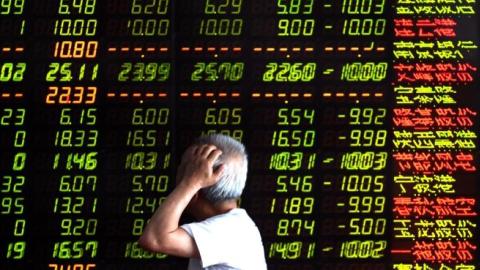The United States had its financial crisis during the previous decade and Japan is just emerging from its two decades of virtually non-existent growth.
China is now struggling to deal with the consequences of a vastly overvalued stock market, chronic over-investment, and the makings of a classic property bubble.
The common wisdom is that the country is at least "blessed" with an authoritarian government able to sacrifice short-term goals for long-term interest.
In reality, the controlling hand of the Chinese Communist Party is at the heart of the country's problems and its economic challenges stem in large part because of too much control and involvement of the Party rather than too little.
If China is to suffer a Japanese-like slowdown, or a sudden financial bust-up as occurred in America, the consequences are likely to be much more traumatic for the Chinese people than it was for Americans and Japanese, and the capacity of the Party to remain in power will be severely undermined.
Blame game
Like Japan in the 1970s and 1980s, China is nearing the end of being able to rely on exports and capital investment to drive growth-and is looking to shift toward policies that can enhance domestic consumption.
Why blame the government in China's case?
Take the property bubble. It emerged largely as a government driven response to the global financial crisis which devastated its advanced economy export markets.
From 2009 onward, Beijing responded with the largest fixed investment stimulus in history, forcing state-owned banks to lend predominantly to state-owned-enterprises (SOEs) to build more things for the sake of headline growth, for example, ghost cities and empty residential housing.
Whereas fixed investment contributed 20% to 25% of GDP growth in the 1990s, it was behind 90% of growth in 2009 according to World Bank figures.
Flushed with cheap credit created out of the savings of its citizens in the coffers of state banks, SOEs then made a killing by on-lending money to the credit starved private sector at exorbitant rates, with private and SOE firms in turn using over-valued assets as collateral for more borrowing.
From 2008-2014, new credit flooding the economy increased by over US$20 trillion, far exceeding the size of the entire American commercial banking sector.
Then consider the current stock market turmoil in China dominating current headlines. The drivers of the wild ride up and down are similar.
Capital controls designed to prevent capital flight and keep state-owned banks solvent mean that Chinese private firms and households cannot easily take their savings out of the country.
Panic sets in
Households and private firms receive barely any return from savings in state banks bound by ceilings imposed on deposit rates. Individuals and the private sector face obstacles in terms of accessing many of the best economic opportunities in the country, which are reserved for SOEs.
And with the property boom flatlining, speculating on the stock market has become one of the few ways to make a decent return.
Crazy stock prices will always come down when panic sets in. And a deep concern for the government is that the majority of listed shares are state-controlled firms.
This means current government measures to flood the economy with even more money to stem share price losses -- unlikely to succeed in any event -- may well be as much about protecting SOE valuations as it is about assisting private investors.
The trading halt on more than 1,300 listed firms is likely to deepen a sense of crisis rather than lessen it.
Long view
Taking the long view, Japan's experience is unlikely to offer any comfort for China.
When Japan's economic malaise began, the country had built solid institutions: rule of law, real and intellectual property rights and protections, independent courts.
Despite the slowdown, the country was well positioned to seamlessly take a seat alongside other genuinely advanced, innovative and fully industrialized economies.
Japan had also developed a political system not dependent on growth for stability.
This was clearly evident when the Liberal Democratic Party, which had ruled nearly without interruption since 1955, lost power in 2009 and initiated a handover without turmoil or bloodshed.
Even though the Japanese model was frequently described as state-led, the private sector in the 1970s onward received the lion's share of national capital and opportunity.
This meant that prosperity was broadly distributed during the good years, unlike in China where SOEs and the politically-connected, rather than households, have been the primary beneficiaries of growth.
As evidence, just look at the makeup of the majority of the Party's estimated 85 million members that comprise the business and social elites.
Old and poor
From the late 1990s onward, China has gone from the most to one of the least equal countries in all of Asia.
Its hyper state-led model means the vast majority of households will grow old and never become rich.
As the country's GDP has increased, political and social stability has worsened exponentially.
Instances of mass unrest against the government were well over 184,000 in 2013, according to official figures.
Beijing officially spends more on internal security than it does on national defense. Imagine the result for the Party if an economic downturn takes hold.
Whereas its authoritarian approach might have played a role in supercharging growth in past years, the Party now needs to step back economically, socially and even politically for the country's fledging private sector to take the lead and thrive.
That the Party is responding to the country's economic problems, and its own political vulnerabilities, by strengthening its grip in all aspects rather than loosening it is not encouraging.














